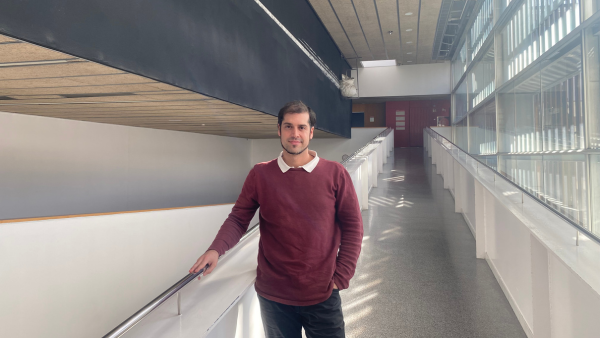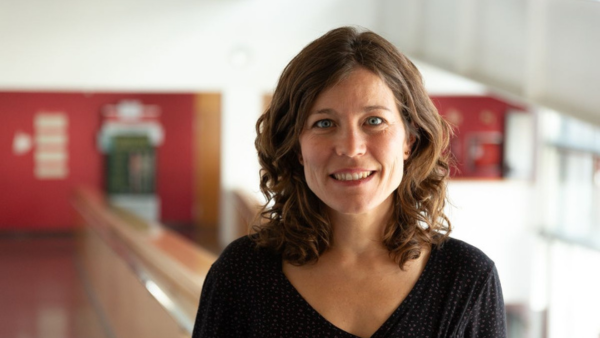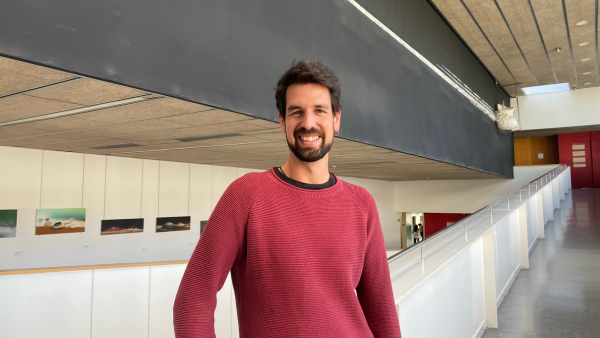Entrevista al doctorant Hao Jia
Research group: Data and Signal Processing Research Group
Doctoral Program: Experimental Sciences and Technology
Tell us about your career prior to joining Uvic as a doctoral student? (studies, professional experience)
2014.09-2018.06 Bachelor
Nankai University, Tianjin, China, major in ‘Intelligence Science and Technology’
2018.09-2021.06 Master
Nankai University, Tianjin, China, major in ‘Control Science and Engineering’
What made you decide to start the PhD?
There are two reasons. The first reason is about a dream. When I was a kid, I want to be a scientist when I grow up. After I got the bachelor degree, I found that there are many requirements for a scientist. PhD is just the entrance of becoming a scientist. Therefore, I decided to start the PhD so that I can check if I’m qualified for a scientist and get some basic training.
The second reason is about the preparation as a PhD candidate. When I was a master student, I proposed a method, which is a basic method in my research area. I was confident at that time because this method can be improved. And I believe that I can meet the requirement for a PhD within one or two years. Therefore, I decide to pursue the PhD degree because it is much easier for me than others. I have the foundation and the planning to publish papers as a PhD student.
What is the title and field of study of your thesis?
The title is “Towards Multi-class Classification of Upper Limb Movements in Brain-Computer Interface”. The field of this study can be concluded by the following keywords: brain-computer interface, pattern recognition, movement classification with brain signals.
Could you explain for a non-expert audience what are the main objectives of your thesis and what might be the impact of the results at a scientific or social level?
For stroke patients, because of the impaired movement circuit and the weakness of the muscles, they will feel difficult to move their limb when their brains want to move. The weakness of the muscles can be recovered by regular limb movement exercises assisted by healthy people or exoskeletons. We think that it will help the repairment of the impaired movement circuit and the rehabilitation of the patients if their limb executes movements as soon as the brain of the patients have the intention to move.
However, for a patient who cannot move their limbs without external assistances, how to know his movement intention as soon as he has the intention to move. The answer is the brain-computer computer interface, which can observe the brain activities by the signals acquired from the brain scalp.
My research objectives are proposed a classification method that can be used to distinguish the intention to move and the intention to keep resting before the onset of the movement; Proposed a multi-class classification method that can be used to classify multiple movement states, such as elbow flexion, pronation, hand close, etc.
Limited to the research process, the data used is a public dataset which is acquired from healthy people. The results of the first objective have been published in the journal “Journal of Neural Engineering” (JCR Q1). I hope my work could help the assistance and rehabilitation of the stroke patients.
How long have you been doing the thesis and what have been the main results and the main difficulties so far?
Although I’m in the second year as a PhD candidate, I have been in the current research area for about 3.5 years because my thesis is based on my previous achievements. After years’ development in this area, the algorithms I proposed reached to the classification performance bottleneck, which is limited to my understanding and horizons. Therefore, if I want to continue my research in the future, I have to learn more about the neuroscience and combine my current study with other research areas.
How do you value this stage on a personal level and what needs have you been able to identify to improve the quality of life of doctoral students?
I think that the period as a PhD candidate plays two main roles in one’s academic period. First, this period summarizes what we have learned before. In the past years, we were taught how to solve the problems, such as 1+1=2, the trigonometric functions, the derivates. These problems have been solved by the pioneers. For us, these problems have become the information and the knowledge we can use. We have learned not the solutions to these problems, but also how these solutions were given. We know to conduct from the known information, or make assumptions, etc. Now, as a PhD candidate, we are using, the idea we have learned to solve a problem, to solve the new and unsolved problem.
Second, this period validates whether we can get used to the further academic. As well known, PhD is the entrance of academic period. During the academic training as PhD candidate, we find our drawbacks as scientist and correct or avoid these drawbacks. However, sometimes we may find that we don’t like or cannot get used to the life like this. Although we can get the PhD degree with our efforts, it doesn’t agree with that we would like to continue the academic period. The PhD degree means that we are qualified as a scientist, but not suitable as a scientist. If one cannot find it interesting in exploring the new as PhD candidate, it is a good choice to stop here. Interest is the one of the main factors to push one to become a scientist. I’m not sure what needs to improve the quality of life of doctoral students.
What advice would you give to a colleague who wants to start a PhD?
“Would you like to look for a new solution for a problem?” “What is the meaning of the PhD degree to you? You just want to get a PhD degree, or you really like exploration of the new area”
The aim of two questions is to know whether you can stick to the life as a PhD candidate. PhD candidate period is not only life as a student, but also life of pursuing. You may find explorations on new areas is honorable and glorious. However, now that these explorations you heard are reported to the public on the newspaper, they have got good scientific results. Most of explorations are boring. You need to do the experiments again and again and you will receive negative responses from most of the experiments. For the reported explorations, they also went through this process before they succeed.
If you want to get a PhD degree and don’t like to explore on the new, you must be mentally determined and optimistic so that you can go through the plenty of experiments before you get the degree. If you find it interesting in the exploration of new areas and you need a PhD degree to continue your dream as a scientist, don’t hesitate to start the PhD. If you really cannot determine your mind, don’t forget your thesis supervisor will give you a lot of help after you start a PhD. You are not fighting alone. Ask them for help and suggestions.





